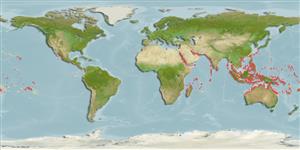Teleostei (teleosts) >
Lophiiformes (Anglerfishes) >
Antennariidae (Frogfishes)
Etymology: Antennarius: From Latin, antenna, antemna = sensory organ (Ref. 45335).
Environment: milieu / climate zone / depth range / distribution range
Ecology
Marine; reef-associated; depth range 1 - 15 m (Ref. 90102). Tropical; 30°N - 24°S
Indo-West Pacific: Maldives (Ref. 30829) and Mauritius to Indonesia, Singapore, the Philippines, Papua New Guinea and the Solomon Islands. Recently reported from New Caledonia (Ref. 11889).
Size / Weight / Age
Maturity: Lm ? range ? - ? cm
Max length : 15.0 cm TL male/unsexed; (Ref. 48635)
Short description
Identification keys | Morphology | Morphometrics
Dorsal spines (total): 3; Dorsal soft rays (total): 11 - 12; Anal spines: 0; Anal soft rays: 6 - 7. Characterized by numerous prominent wart-like protuberances on its skin and a large esca that mimics a tiny fish. Bony part of the illicium with numerous crossbands and approximately twice as long as the 2nd dorsal spine. Coloration is highly variable, ranging from cream to yellow, brown, or black with scattered dark circular spots and saddles or blotches ranging from white to pink, rust-red, or red. Heavily spotted individuals resemble A. pictus. Usually has red or orange margins on all fins and the first band across the body diverts to the posterior edge of the eye which distinguishes it from A. pictus (Ref. 48635).
Inhabit sheltered rocky reefs (Ref. 559). Adults are usually with sponges (Ref. 48635). Juveniles openly on reefs looking like nudibranchs (Ref. 48635). Feeds on fishes (Ref. 89972). Oviparous. Eggs are bound in ribbon-like sheath or mass of gelatinous mucus called 'egg raft' or 'veil' (Ref. 6773). Solitary, frequently among algae, sponges and soft corals (Ref 90102).
Life cycle and mating behavior
Maturity | Reproduction | Spawning | Eggs | Fecundity | Larvae
Oviparous. Eggs are bound in ribbon-like sheath or mass of gelatinous mucus called 'egg raft' or 'veil' (Ref. 6773).
Pietsch, T.W. and D.B. Grobecker, 1987. Frogfishes of the world. Systematics, zoogeography, and behavioral ecology. Stanford University Press, Stanford, California. 420 p. (Ref. 6773)
IUCN Red List Status (Ref. 130435: Version 2024-2)
Threat to humans
Harmless
Human uses
Fisheries: of no interest; aquarium: commercial
Tools
Special reports
Download XML
Internet sources
Estimates based on models
Preferred temperature (Ref.
123201): 25.2 - 29.3, mean 28.5 °C (based on 3049 cells).
Phylogenetic diversity index (Ref.
82804): PD
50 = 0.5005 [Uniqueness, from 0.5 = low to 2.0 = high].
Bayesian length-weight: a=0.02630 (0.01029 - 0.06725), b=2.96 (2.73 - 3.19), in cm total length, based on LWR estimates for this (Sub)family-body shape (Ref.
93245).
Trophic level (Ref.
69278): 4.2 ±0.73 se; based on food items.
Resilience (Ref.
120179): High, minimum population doubling time less than 15 months (Fec assumed to be > 10,000).
Fishing Vulnerability (Ref.
59153): Low vulnerability (10 of 100).
